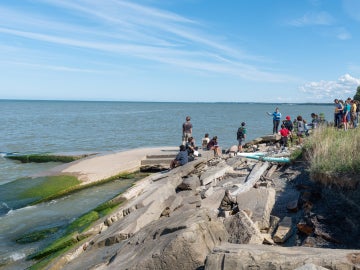Paul Kamitsuka Earns Goldwater Scholarship
Fourth-year neuroscience major eyes graduate school and advanced research in neuro-oncology.
June 13, 2022
Yvonne Gay

Photo credit: Tanya Rosen-Jones '97
In his first three years at Oberlin, neuroscience major Paul Kamitsuka conducted research aimed at establishing and understanding nature-nurture interactions in brain disorders—studies that illuminated a path toward graduate research of brain cancer and other diseases.
Now the fourth-year student from Avon Lake, Ohio, is the recipient of a 2022 Barry Goldwater Scholarship, which will support his final year of undergraduate studies at Oberlin.
Established by the U.S. Congress in 1986, the Goldwater Scholarship is a highly competitive, merit-based award offered to college sophomores and juniors preparing for careers in the natural sciences, engineering, and math. Many winners have gone on to earn prestigious postgraduate honors, including National Science Foundation Graduate Research Fellowships, Rhodes Scholarships, and Marshall Scholarships.
Kamitsuka, who paired his neuroscience major with a minor in chemistry, is interested in further studying what can go wrong with cellular and molecular mechanisms that regulate nerve cell function in the brain, as well as the ways disruption in energy production affects other seemingly separate biological processes to cause diseases.
“Although neurodegeneration is the progressive loss of nerve cells, and cancer is the uncontrolled growth of cells, the metabolic characteristics between the two diseases are strikingly similar,” he explains. “Brain cancer is particularly fascinating because of the strict metabolic regulation that is needed to provide sufficient energy for the brain, the practical challenge of dealing with this balance, and the challenge of drug delivery to the brain.
“These factors, the lack of a cure or efficacious treatment options, and my interests in studying cellular metabolism have led me to want to pursue a career as a medical scientist in neuro-oncology.”

At Oberlin, Kamitsuka works in the lab of Biggs Professor of Neuroscience Gunnar Kwakye, whose research team studies the impact of environmental pollutants on the development and progression of various neurological disorders such as Parkinson’s, Huntington’s, and multiple system atrophy diseases, which are characterized by selective loss of nerve cells, motor incoordination, and altered involuntary functions such as breathing and blood pressure.
Ongoing research conducted by Kamitsuka and other members of Kwakye’s lab examines the effects of the heavy metal cadmium—which is abundant in our environment and in tobacco plants—on the development and severity of Huntington’s disease. The lab also undertakes ongoing collaborative research projects aimed at using innovative drug discovery through computer-aided drug design, genetic editing, and chemical synthesis of small molecule probes to interrogate human biology processes and disease states in neurodegenerative diseases and breast cancer, toward the goal of developing new therapeutics.
Kamitsuka and Kwakye are coauthors on a collaborative research paper under review that demonstrates the efficacy of a novel small molecule in altering energy function in triple-negative breast cancer cells and mice.
In addition to his studies, Kamitsuka serves as a student coordinator for Oberlin’s Center for Learning, Education, and Research in the Sciences (CLEAR) and is a member of the American Medical Student Association. He is involved with Oberlin’s Pre-Medicine and Health Careers program, which offers the support of a collaborative community and specialized guidance from advisors dedicated to careers in health care. He has also volunteered for the local retirement community Kendal at Oberlin, engaging with residents—even during the height of the pandemic—through the creation of intellectually stimulating videos and through phone conversations with those experiencing dementia.
“The immense support of my research mentor, Professor Kwakye, and other mentors within the department of chemistry, neuroscience, and CLEAR have made my academic and experiential learning here at Oberlin exceptional,” he says.
Kwakye extends gratitude to Nick Petzak, Oberlin’s director of fellowships and awards, for his guidance in promoting Kamitsuka’s candidacy for the Goldwater honor. “Paul’s dedication and enthusiasm for science and medicine is inspiring and commendable,” he says. “I am elated by the news that he has received this well-deserved award.”
In addition to the Goldwater Scholarship, Kamitsuka is a 2022 recipient of the Society of Toxicology Undergraduate Research Award, which fosters interest in graduate studies in the field of toxicology and adjacent scientific fields.
“I am incredibly excited to continue my academic and professional journey and explore the many paths within medicine and science,” he says. “Specifically, I look forward to meeting many like-minded individuals and growing as a learner, researcher, and medical provider.”
You may also like…
Oberlin Named a Top Producer of Fulbright Students for 2025-26
Oberlin College and Conservatory was named a Top Producer of Fulbright students for the 2025-2026 academic year.
Research Roundup
Every day, Oberlin’s faculty and students produce scholarly work that uncovers new insights into how we understand the world, particularly in the areas of sustainability and the environment.
Leo Hidy ’23 Earns 2026 Marshall Scholarship
Leo Hidy ’23, a comparative American studies major who also studied business and economics while at Oberlin, has received a 2026 Marshall Scholarship that will fund two years of graduate study in the UK.


